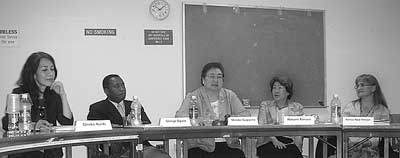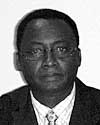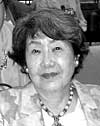Education, A Key Element of Human Security and Sustainable Development
WFWPI Midday Workshop at 59th DPI/NGO Conference
Moderator: Ms. Motoko Sugiyama, Director of WFWPI UN Office
Panelists:
George Ogurie-Field Director, IRFF Nigeria Advisor IIFWP HIV/AIDS Prevention Initiative , Nigeria
Harumi Kimura-Professor Emeritus at Kyorito Women's University, Essayist, Author, Japan
Chieko Kuriki- Professor of Journalism at Chubu University , Journalist, Author, Japan
Nancy Hinson- Educator, Member of Senior Mgmnt team at Headstart/ECE, Spokane Community College , USA
As the Midday workshop co-sponsored by WFWP Japan and IIFWP began, Conference Room A was full to capacity with nearly 100 people, demonstrating that education continues to be an area of concern for many conference attendees. Panelists were from an array of backgrounds and offered insights from their respective areas of expertise.
Mr. George Ogurie explored the connection between HIV/AIDS prevention and advocacy and sustainable development. Historically, the concept of sustainable development implied development that respected and limited impact on the environment. Discussions over time gave rise to other definitions. Of many definitions, Ogurie concluded the bottom line is a dire need to strengthen consciousness through education. The behavior of each of us has consequences to the circumstances of many others in the entire world. He related this to what is known about HIV/AIDS, its prevention and treatment. HIV/AIDS is preventable but there are many philosophies for approaching the problem. He is dismayed that some in the field criticize other approaches. Ogurie stressed that HIV/AIDS prevention is a life and death matter. Maintaining abstinence prior to marriage and fidelity with in marriage is a sure way to prevent. He concludes that all approaches have a place in this fight and admonished partners not to undermine each other. There is a need for further education and short and long term approaches. He informed us of the trend for nations to spend less on HIV/AIDS education and prevention and more on treatment and stressed that consistent ongoing prevention education must be a key part of the strategy to combat HIV/ AIDS.
Ms. Harumi Kimura expressed particular concern about increased self-centeredness and individualism of Japanese young people. She attributed this to a trend away from educating about the value of the group and respect for tradition stemming from American influence following the Second World War. The Basic Education Law was enacted in Japan during reconstruction. The Americans would not allow the law to include any reference to teaching respect for tradition. The focus was respect for and rights of the individual. Ms. Kimura expressed concern that this has led to young people who have only a weak connection to their communities and little sense of responsibility to others. Now the educational community and government are rethinking and will work toward educating children and young people to understand themselves as individuals in the context of their community, their responsibility to others and in relation to traditions and the past. She believes this aspect of education is crucial for raising youth who will value peace and working together with one another.
Ms. Chieko Kuriki spoke about the process of development of good journalists and the role they play to educate and inform the larger community about issues and situations. She stressed the importance of integrity among journalists and the sincere desire to penetrate the truth of a circumstance. Good listening skills are important. She said that an interviewer needs to be able to open the heart of the interviewee. This takes trustworthiness. She informed us that if an interviewee does not trust the interviewer, they will not tell the truth or reveal themselves deeply. She downplayed the show business and ego concepts about journalism. A good journalist is a good citizen, according to Ms. Kuriki. In fact, she said that it is crucial that journalists ask the hard questions and report about the difficult issues. If they are not reported about, it is as if they do not exist. She believes journalists need to tell the stories that need to be told. Doing so will help create a better, more peaceful world.
Ms. Nancy Hinson guided us on the important role of Early Childhood Education to ensure the full potential of children. Her background in the field in Washington State , where early childhood education is a focus, armed her with knowledge of the most recent research on brain development. Because brain development begins in the womb and much development occurs before a child is three, she stressed that parents are key figures in meeting the developmental needs of small children. Research shows there are healthy types of stress that aid development, such as new situations for learning and meeting other children. There are tolerable types of stress for children like a one time catastrophic event i.e. death of a loved one, parent's divorce, going through a natural disaster like an earthquake or hurricane that kids can get through with the right support. But there is toxic stress that can actually cause brain tissue to deteriorate such as neglect, starvation, living in war, etc. This demonstrates scientifically that children are affected detrimentally and permanently by not having their basic needs met in a consistent way. Ms. Hinson listed extensive resources for parents and early childhood educators with the hope that those in the field would utilize the materials to further their work and educate their legislators and parliamentarians about this issue so crucial to human security and sustainable development.
Perspectives of the panelists were diverse. One question that arose was how all these aspects tied together. Panelists agreed that the importance of education for human security and sustainable development was the theme at the core of each talk. Whether it is how to prevent HIV/AIDS, character development, journalism for social change, or raising and nurturing children so they get all they need to be the best and most that they can be, education is required for the sharing of knowledge and understanding.
WFWPI Luncheon Meeting
UNHQ Delegates Dining Room 1
September 7, 2006 1PM
WFWPI and WFWP Japan cosponsored a luncheon meeting for forty members of the Japanese delegation to the DPI/NGO Conference and guests from USA . Special guest, Ms. Michele Federoff, Deputy Chief of NGO Section DESA joined the luncheon and was delighted to see women she met during her trip to Japan with WFWP several years ago. She genuinely appreciates the many practical service projects in developing nations that WFWPI operates.
Mr. Shoji Nishimoto, Assistant Administrator and Director of the Bureau for Development Policy United Nations Development Program prepared a special presentation for the group entitled Partnering for Change: Realizing the MDGs together by 2015. He informed us of the ways UNDP is partnering with NGOs and civil society organizations. He gave a brief review of progress on the MDGs, capacity building of UNDP and the focus on empowerment of women and gender equality. Mr. Nishimoto informed us that UNDP encourages policy dialogs between governments, civil society organizations and donors, advocates for legal changes to allow civil society greater ability to participate in development. He emphasized that UNDP views civil society organizations as equal and vital partners in overcoming development challenges. He acknowledged that civil society plays multiple roles such as advocacy, mediation, mobilization, research and analysis and project implementation. In conclusion, he stressed that particularly women's NGOs are vital partners in narrowing gender gaps which are large impediments to the development process. (Full text of Mr. Nishimoto's presentation)
At the Closing Session of the main conference, Secretary General Kofi Annan and Mrs. Nane Annan gave their farewell to the NGO community, as this will be the last such conference during SG Annan's term. Once again, he showed deep appreciation to the NGO community. "You have made your voices heard and your influence felt," he told us. He reminded us of progress in UN and NGO relations, including the forums held jointly between the General Assembly and the NGO community, as well as critical NGO advocacy, surrounding establishment of the Human Rights Council. "You have the capacity to push the envelope and say things I cannot say and I often love you for it. Looking ahead, you will grow in influence, but use it responsibly. Strengthen alliances that maximize impact. We must share our knowledge and reinforce our actions. Have a dream and then give it a foundation." Mrs. Annan reminded us that we have only one world and we need to keep it in trust for future generations.






